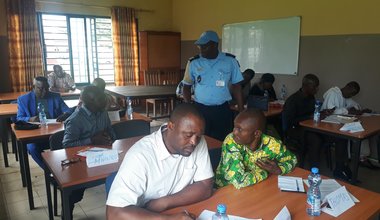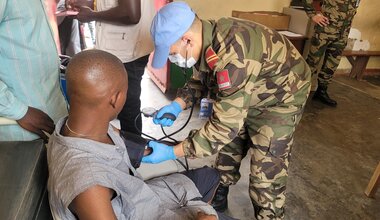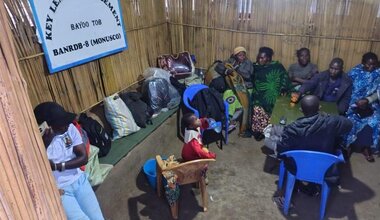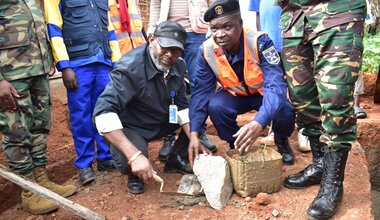MONUSCO Police trains Congolese National Police officers in ballistics
" Ballistics and managing gun-impacted crime scenes" is the theme of a 5-day training provided by MONUSCO since Tuesday, October 22nd, 2019 by MONUSCO Police (UNPOL) for officers of the Technical and Scientific Police Division (DPTS) of the Congolese National Police (PNC) in Kinshasa.
The training will be given by experts from the Serious and Organized Crime Support Unit (SOCSU) of the Police Component of the UN Stabilization Mission in the DRC, assisted by the DPTS trainer, Senior Commissioner ZOLA Manu-Banga.
DPTS technicians will be assisted by the trainers in managing a firearm-impacted crime scene through simulations and demonstrations of all the different stages of technical investigations, including transport of collected ballistic signals from the crime scene to the laboratory’s ballistic office in order to carry out expertise by using comparison.

At the opening of the session, SOCSU Officer, UNPOL Sofiane Ben Chaouacha, representing the head of the MONUSCO police component at the ceremony, stressed the importance of the training.
In his view, ballistics, which refers to "all the phenomena to which the projectile is subjected", is "one of the most frequently used disciplines in criminal investigations due to the frequency in the use of firearms to commit the most serious offenses".
Indeed, he explained, the use of clues and traces on a scene of a crime impacted by a firearm can be decisive in the conclusion of an investigation.
The Acting Director of the Technical and Scientific Police (PTS), Mr. Kasango Begas, representing PNC Commissioner-General, for his part, expressed gratitude to MONUSCO Police for their immense contribution to the professionalization of the PNC in general, and of the PTS officers in particular.
 UN
UN United Nations Peacekeeping
United Nations Peacekeeping






